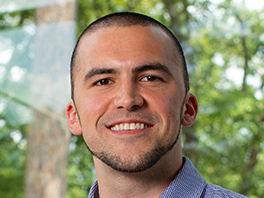Faculty Spotlight
Professor Promotes Veterans Mental Healthcare Through Research
 Dr. Adam McGuire wants to make a difference in East Texas –– one veteran at a time.
An assistant professor in the UT Tyler Department of Psychology and Counseling, McGuire investigates trauma-related distress and attempts to integrate positive psychology
principles into mental health treatment for veterans.
Dr. Adam McGuire wants to make a difference in East Texas –– one veteran at a time.
An assistant professor in the UT Tyler Department of Psychology and Counseling, McGuire investigates trauma-related distress and attempts to integrate positive psychology
principles into mental health treatment for veterans.
His current research focuses on understanding how positive emotions, like gratitude and moral elevation, can be used as a therapeutic tool to alleviate that related distress. Trauma-related distress, or negative consequences of trauma exposure, McGuire said, often includes posttraumatic stress disorder (PTSD), but can include depression, anxiety, substance use, suicidality or excessive guilt, shame or anger.
At UT Tyler, McGuire leads the ELEVATE–or Enhancing Lives and Experiences of Veterans Affected by Traumatic Events–Research Lab, where he conducts his research and works alongside doctoral, master’s and undergraduate students. Their main goal is to improve the lives of veterans who are affected by traumatic experiences.
Unique Population
“Veterans are a unique population that is at high risk for suffering from trauma-related distress and can experience significant difficulties in recovering from what they’ve experienced,” said McGuire, who also holds a dual appointment as an investigator and clinical psychologist at the Center of Excellence for Research on Returning War Veterans in Waco. “I’m passionate about improving the lives of veterans by integrating positive psychology principles because sometimes the mental health field is fixated on just alleviating symptoms or reducing the amount of psychological stress a patient experiences.”
McGuire enjoys working at UT Tyler, and he values the investment that the university has in the region. He notes East Texas needs more resources to provide veterans with mental health services and support.
“I’m appreciative that the university supports initiatives like our doctoral program, which aims to train future psychologists with a specialty focus on veteran mental health, so we can take meaningful steps to make an impact in this community,” he said.
McGuire also values his interactions with UT Tyler students, as well as those who he mentors in the lab. He calls working with them “very rewarding.”
“I love teaching and collaborating with the students here,” McGuire said. “Their passion and drive for becoming impactful clinicians and researchers is energizing, and it motivates me to challenge myself in those areas as well.”
Significant Research
In a recent collaboration with Yale University, McGuire analyzed data from a large, population-based study of veterans to examine the role of trait gratitude in mental health of veterans; specifically, looking at how gratitude relates to current and future mental health symptoms and diagnoses. The team found that reported levels of gratitude at baseline predicted the future development of PTSD, depression, anxiety, suicidal ideation and suicide attempts over a seven-year period. “Specifically, we found that veterans who were extremely high on gratitude were at reduced risk, whereas veterans who were extremely low on gratitude were four to 10 times more likely to develop those problems,” McGuire added.
He also developed and validated a new scale recently for measuring moral elevation that will be available for future use in both general populations as well as clinical populations who might be experiencing significant psychological distress. Moral elevation—a key focus of the lab’s work—is a distinct emotion that occurs after witnessing another person perform a virtuous act, McGuire said. The experience of elevation, he added, is often described as feeling “inspired,” “uplifted” or “moved.”
Currently, the lab started a new research project that aims to survey veterans nationwide who engage in volunteer work to better understand how volunteerism impacts their mental health and social functioning. This study includes repeated measurements across multiple years, McGuire said, so the team can assess how the potential impact of volunteerism and possible moral elevation experienced in real-life events are beneficial for veterans over time.
In Waco, he is working on several projects including a grant-funded study that is testing a pilot trial of an online moral elevation intervention titled MOVED. This intervention is designed for veterans with PTSD symptoms and moral injury distress.
He ultimately hopes to conduct new clinical trials with novel interventions that will aim to incorporate gratitude and moral elevation.
“Specifically, my goal is to test another online intervention that uses moral elevation in the near future, while also exploring other treatment approaches that incorporate positive psychology principles” McGuire said. “For example, we are currently preparing to pilot a treatment for veterans that focuses on recalling positive memories and increasing awareness of positive experiences—something that can be absent or difficult to experience for veterans with significant PTSD symptoms.”
Advice McGuire Offers
So, what advice does McGuire offer current and future UT Tyler students? He tells them to take time to discover their own personal values, and to reflect on how those values impact and influence their experiences throughout their educational journeys.
“It’s so easy to get caught up in thinking you have to do something just because it follows a certain path or because that’s what everyone else is doing,” he said. “However, I think you have a better chance of having a more rewarding learning experience and choosing career paths that are more fulfilling to you personally if those experiences are driven by an awareness and pursuit of your own personal values.”
A self-proclaimed Marvel Comics Universe fan, McGuire enjoys Marvel movies and collectibles as well as sports, specifically playing basketball. He is married to his high school sweetheart, Jamie, and together they have one son.
#CEP
Read more from this issue!




